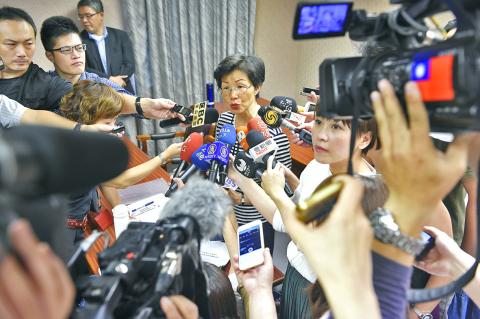Amid renewed debates over the so-called “1992 consensus,” Mainland Affairs Council (MAC) Minister Katharine Chang (張小月) yesterday reiterated that President Tsai Ing-wen (蔡英文) administration respects the historical fact of the 1992 cross-strait talks.
Chang made the remarks on the sidelines of a meeting of the legislature’s Internal Administration Committee, which was reviewing proposed amendments to Article 17 of the Act Governing Relations Between the People of the Taiwan Area and the Mainland Area (臺灣地區與大陸地區人民關係條例).
“President Tsai has stated on multiple occasions our opinions on the ‘1992’ [consensus], which is that we respect the historical fact of the 1992 [talks], with the key being seeking common ground, while reserving differences,” Chang said.

Photo: Chen Chih-chu, Taipei Times
Chang said that over the past two decades, both sides of the Taiwan Strait have made several achievements though communication and interaction.
Both sides should cherish and value these achievements, she said, adding that the government hopes to continue to improve cross-strait ties based on that political foundation.
The “1992 consensus” — a term former council chairman Su Chi (蘇起) admitted to making up in 2000 — refers to a tacit understanding between the Chinese Nationalist Party (KMT) and the Chinese Communist Party that both sides acknowledge there is “one China,” with each side having its own interpretation of what “China” means.
Debates about the existence of the “1992 consensus” have been renewed after American Institute in Taiwan Chairman Raymond Burghardt said in an interview with Voice of America in Washington on Wednesday last week that the term “1992 consensus” did not exist until Su used it in 2000.
China’s Taiwan Affairs Office spokesperson An Fengshan (安峰山) on Saturday said that cross-strait communications were suspended on May 20 due to Taiwan’s failure to recognize the “1992 consensus,” which An said is an embodiment of the “one China” principle serving as the political foundation for cross-strait relations.
Asked by reporters about Burghardt’s remarks, Chang said the government’s stance is that it respects the historical fact of the 1992 talks and the achievements accumulated over the past two decades based on the shared understanding of seeking common ground, while reserving differences.
“The council will continue communications with Beijing and keep up efforts to accumulate goodwill across the Taiwan Strait,” she said.
She added that the amount of Chinese investment in Taiwan between January and last month showed an upward trend.

Chinese spouse and influencer Guan Guan’s (關關) residency permit has been revoked for repeatedly posting pro-China videos that threaten national security, the National Immigration Agency confirmed today. Guan Guan has said many controversial statements in her videos posted to Douyin (抖音), including “the red flag will soon be painted all over Taiwan” and “Taiwan is an inseparable part of China,” and expressing hope for expedited reunification. The agency last year received multiple reports alleging that Guan Guan had advocated for armed reunification. After verifying the reports, the agency last month issued a notice requiring her to appear and explain her actions. Guan

GIVE AND TAKE: Blood demand continues to rise each year, while fewer young donors are available due to the nation’s falling birthrate, a doctor said Blood donors can redeem points earned from donations to obtain limited edition Formosan black bear travel mugs, the Kaohsiung Blood Center said yesterday, as it announced a goal of stocking 20,000 units of blood prior to the Lunar New Year. The last month of the lunar year is National Blood Donation Month, when local centers seek to stockpile blood for use during the Lunar New Year holiday. The blood demand in southern Taiwan — including Tainan and Kaohsiung, as well as Chiayi, Pingtung, Penghu and Taitung counties — is about 2,000 units per day, the center said. The donation campaign aims to boost

The Kaohsiung Tourism Bureau audited six hotels in an effort to prevent price gouging ahead of Korean band BTS’ concert tour in the city scheduled for Nov. 19, 21 and 22 this year. The bureau on Friday said that the audits — conducted in response to allegations of unfair pricing posted on social media — found no wrongdoing. These establishments included the local branches of Chateau de Chine, Hotel Nikko, My Humble House, and Grand Hai Lai, it said, adding that the Consumer Protection Commission would have penalized price gougers had the accusations been substantiated. The bureau said the Tourism Development Act

The military yesterday said it has located the flight data recorder, or black box, of an F-16V jet that disappeared off eastern Taiwan earlier this month, and it would soon deploy a salvage team to try to retrieve it. Air Force Command Headquarters said that while it had pinned down the location of the black box, it was still searching for the aircraft’s sole pilot, air force Captain Hsin Po-yi (辛柏毅). Without providing details, the air force said it had located the black box days after detecting some intermittent signals and would now engage a team of professionals to retrieve it. The air